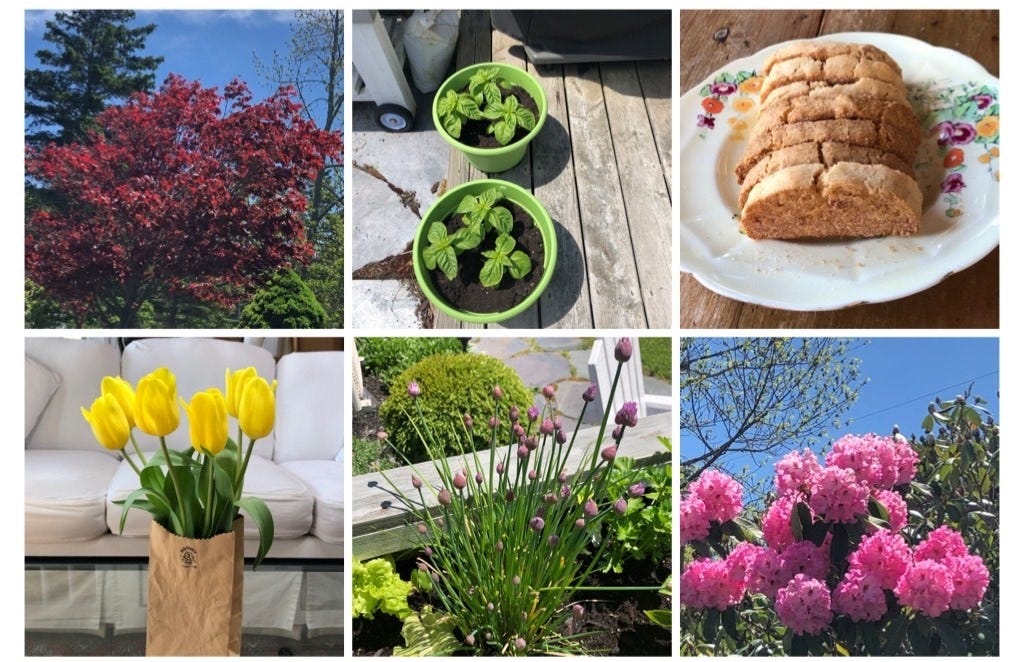The good news is that it’s been a wonderful week.
The basil is growing splendidly, and the Japanese Maple seems to be struggling after 30 years but is still putting forth beautiful but smaller leaves. I had the energy to bake Mandelbrot for friends. I love the look of chive flowers and our rhododendrons are bursting with blooms. Our lovely hummingbirds are with us from dawn to dusk and refilling the nectar is a daily task. The warm weather and my newfound wellness and energy has allowed me to have “porch visits” with friends. It’s safe to say the source of the improvement in my quality of life stems from the significant reduction of one of the drugs that is injected weekly. I know that this may extend my weekly treatments, but at this point it feels more than worth it. The neuropathy has lessened and the styes are gradually calming down.
Saturday was the day when I hit the all-too-familiar wall of total exhaustion. I remained in bed for the majority of the day, but I was not unhappy. I wasn’t flooded with the usual range of emotions that typically accompany the lowering levels of steroids. There were no tears and no self-pity. I felt calm and enjoyed the comforts of my bed and the peace of a rainy day. My daydreams were about the July visit of our children and grandchildren. It will be almost a year since we’ve had a visit with our grandsons.
Sunday began with having had a good sleep and the welcome absence of weakness in my arms and legs. These limbs act as indicators for how any given day will unfold. If they feel weak and shaky when I wake up, I know that chemo fatigue is likely to define the day. I tend to avoid all literature that’s cancer-related unless a symptom emerges that makes me wonder if it could be a side effect of treatment. The waiting room at the hospital has a shelf lined with Canadian Cancer Society booklets on a variety of topics. I flipped through a pamphlet on “Fatigue.” It defined the fatigue that one experiences as a result of chemotherapy as one that is “not relieved by sleep or rest.” Well, I have to say that it’s nice to see this confirmed in print.
I’m now in my fifth month post diagnosis and I still find it surreal that I have cancer, let alone one that is presently considered incurable. Currently, with treatment, the life span of patients with Multiple Myeloma and Amyloidosis is extended on average for about eight years. I may make it to 80, but I already know that I won’t want to endure another round of chemotherapy. To lose quality of life, not just for myself, but also for Tony, is not acceptable. At what cost?
What price is one willing to pay to try and reach the goal of eight more years? This morning, and indeed this past week it feels worth it, but there have been many days when I’ve questioned it. Each time I’ve reached the point where I’ve wanted to quit treatment, Tony has assured me that we will get through this together. With his love, support, and encouragement, I’ve been able to get through my darkest hours.
On Monday, Tony and I both had appointments at 8 a.m. I had my Monday morning blood draw and he had an appointment for his car. He fretted about the logistics of how he would drive me to our lovely little local hospital and then pick me up. The night before, we agreed that if I felt well enough, I would drive myself into Lunenburg, just a few kilometres from our house and then I would drive the short distance to meet him at the local garage that we use. He agreed reluctantly. He’s the most attentive caregiver in the world and it’s hard for him not to fret when I feel strong enough to do things without his assistance.
How well I understand that feeling. The nagging worries I had whenever I was with my late father and he would assure me that he could manage certain tasks independently. Letting go of the people we love, be it our children, our parents, or our partners is tough. Let me rephrase that. It’s very tough for me. I just want to make everything better for the people I love, be they family or friends. It’s such a powerful instinct within me and all these years later I struggle to accept that I can’t fix everything. I’m a slow learner. I hear my father’s words, “it’s never too late to change.” “You can’t live your children’s lives.”
The sensation of getting into the driver’s seat of my car and driving down the peninsula filled me with happiness. That feeling was amplified by walking into our beautiful little Fisherman’s Memorial Hospital. The experience brings to mind the song from that long ago show, Cheers, “where everyone knows your name.” I’m greeted like an old friend by the woman who does the Covid check, by the women at the admitting window, and by the wonderful technicians who do the weekly blood draws.
As I drove to meet Tony, I passed our local grocery store and saw that there were only three cars in the parking lot at that early hour. I told Tony that I felt “great” and that what I wanted to do more than anything else was to go to the grocery store and just walk up and down the aisles with my N95 mask. It’s something I haven’t done since starting treatment. When we drove to the store, the same three cars were there and he agreed to indulge me in what seemed a reasonably safe experience. I was in heaven. Just to be able to see what was available in person rather than online. It felt so normal!
Baking Mandelbrot was next on my list of what to do with my strength and happiness. Tony kept telling me to rest, but I assured him that my body would let me know if I needed to rest. By lunchtime, I just wanted to find ways of extending the joy I felt in wandering the aisles of the supermarket. I suggested we go out for lunch. The day was so warm and beautiful that the idea of finding a roadside hot dog or hamburger stand and then being able to eat outside was appealing. We ended up in Mahone Bay and found a food truck parked beside the Salt Box Craft Brewery. There was a lovely patio with tables shaded by umbrellas and hardly another soul in sight. Mondays at 1:00 o’clock—that will be our new dining out experience when the weather cooperates.
Driving myself to the hospital, a wander through a grocery store, and lunch and a drink at a local brewery, it was magical for me.
It’s now Saturday morning and I continue to feel well. It’s clear that the much lower dose of the drug that has been the source of much of my unpleasant side effects has made a huge difference in the quality of my days. There is that nagging worry about how this will ultimately effect the goal of getting the disease into remission, but that’s a topic for discussion when I have a phone consultation with my hematologist on Monday.
As ever,
B






